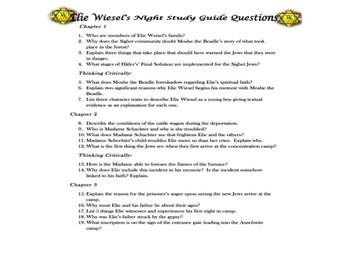Imagine a world where your humanity is stripped away, replaced by a chilling sense of isolation and despair. Now, imagine this reality not as a nightmare, but as a lived experience. This is the harrowing reality Elie Wiesel unveils in his profound memoir, “Night.” It’s a story that transcends time, a testament to the resilience of the human spirit in the face of unimaginable cruelty. It’s a book that challenges us to grapple with complex questions about faith, suffering, and the very nature of good and evil. This study guide delves into the depths of Wiesel’s masterpiece, offering questions that encourage introspection and deepen your comprehension of this powerful narrative.

Image: www.teacherspayteachers.com
“Night” is not merely a historical account of the Holocaust, it’s a visceral journey into the heart of human endurance. It forces us to confront the darkest aspects of our history and, in doing so, compels us to reflect on our own capacity for empathy and compassion. By grappling with the questions presented here, you’ll move beyond the factual knowledge of the Holocaust, entering the realm of profound meaning and personal reflection.
Comprehending the Text:
- The Power of Language: Wiesel’s choice of words is deliberate. How does he use language to paint a picture of the dehumanizing conditions of the camps? What is the significance of his use of the word “night” as both a literal and metaphorical representation of his experience?
- Faith in Darkness: Elie’s struggle with his faith is central to the narrative. Why does he question his faith? How does his faith evolve, or change, throughout his journey? What role does faith play in the face of unimaginable cruelty?
- The Nature of Evil: “Night” offers a haunting glimpse into the depths of human evil. How does Wiesel portray the brutality of the Nazis? How does his portrayal challenge our understanding of the nature of evil and human capacity for cruelty?
- Solidarity and Betrayal: Within the confines of the concentration camps, relationships are tested. How do those relationships, particularly the bond between father and son, shape Elie’s experience? What are the consequences of the choices individuals make in such extreme circumstances?
- The Power of Memory: Throughout “Night,” Elie confronts the traumatic memories of his time in the camps. How does his memory shape his experience? What is the power of remembering, and the burden of forgetting, in the face of such horrors?
Exploring the Themes:
- The Loss of Identity: One of the most powerful aspects of “Night” is the way it portrays the systematic stripping away of human identity. Why do the Nazis dehumanize their victims? How does this dehumanization impact Elie’s sense of self?
- Survival and Morality: In the camps, survival becomes a relentless struggle. How does Wiesel depict the struggle for survival? What moral dilemmas do the characters face in the face of their own survival? How do their choices challenge our understanding of morality?
- The Human Spirit: Despite the horrors he endures, Elie exhibits incredible resilience. What aspects of his personality allow him to endure the unimaginable? What message does his story convey about the enduring power of the human spirit?
- The Importance of Bearing Witness: Elie’s decision to write “Night” is a powerful act of bearing witness to the horrors of the Holocaust. Why is it essential to remember these events? What is the role of memory in preventing future atrocities?
- The Future of Humanity: “Night” challenges us not just to understand the past, but to ask how we can create a better future. How can we learn from the horrors of the Holocaust to ensure that such atrocities never happen again?
Beyond the Text:
- Connections to Today: Although set in a specific historical context, the themes of “Night” resonate with contemporary issues. How do the themes of the Holocaust relate to contemporary issues such as racism, prejudice, and the rise of authoritarian regimes?
- Individual and Collective Responsibility: “Night” implicates individuals and societies in various ways. Who is responsible for the horrors of the Holocaust? What roles did individuals, institutions, and societies play in the atrocities committed? What are the implications for understanding our own responsibilities today?
- The Role of Art in Remembering: Elie Wiesel’s “Night” is a potent example of art as a tool for remembrance. How does art, in its many forms, help us to remember and learn from the past? What role does art play in promoting empathy and understanding?

Image: www.teacherspayteachers.com
Expert Insights:
“Night” has been studied by scholars and critics for decades, offering valuable insights into the Holocaust and human resilience. It is a text that warrants careful consideration and introspection. By engaging in open discussion and delving into the questions posed in this study guide, you can move beyond simply reading the text to truly understanding its lasting impact.
Elie Wiesel Night Study Guide Questions
Taking Action:
“Night” is a powerful call to action. It reminds us of the importance of questioning injustice, promoting empathy, and actively working for a more just and compassionate world. We must not only remember the horrors of the past but also learn from them. By actively engaging in dialogue, participating in educational initiatives, and advocating for social justice, we can contribute to a future that honors the memory of those lost in the Holocaust and strives to prevent history from repeating itself.
Elie Wiesel’s “Night” is more than just a book, it is a challenge, a call to remember, and a reminder of our shared humanity. By engaging with the questions presented in this guide, you’ll discover the profound impact “Night” has had on our collective understanding of the world and your place within it. Remember, the struggle for a more just and compassionate world starts with each of us; let us never forget the lessons of “Night.”






